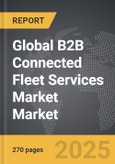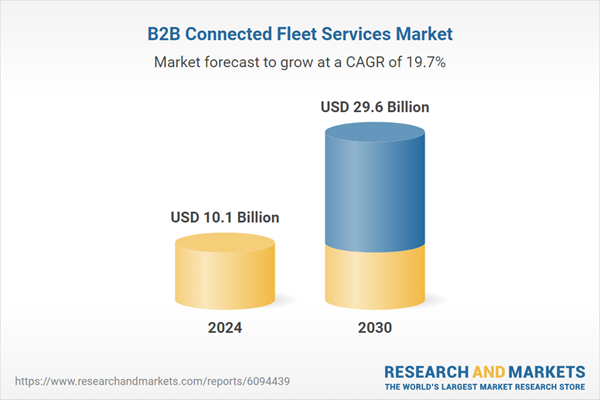Global B2B Connected Fleet Services Market - Key Trends & Drivers Summarized
Why Are B2B Connected Fleet Services Revolutionizing Commercial Mobility and Operations?
B2B connected fleet services are transforming the way businesses manage transportation assets by enabling real-time visibility, predictive analytics, and intelligent automation across fleet operations. These services leverage GPS, IoT sensors, cloud computing, and advanced telematics to allow fleet managers to track vehicle performance, driver behavior, fuel usage, maintenance needs, and delivery schedules from centralized dashboards. The result is improved operational efficiency, lower downtime, enhanced safety, and optimized cost structures - all of which are critical for businesses managing large vehicle portfolios in logistics, construction, mining, utility services, and public transportation. Real-time connectivity enables immediate route adjustments, minimizes fuel waste, and reduces emissions, supporting not only financial goals but also environmental compliance. Additionally, the integration of electronic logging devices (ELDs) and digital tachographs has helped companies meet increasingly strict regulatory mandates for driver hours and vehicle inspections. These systems also foster proactive vehicle maintenance by flagging issues before they escalate into costly breakdowns. As e-commerce accelerates and just-in-time delivery models become standard, connected fleet services are helping businesses stay competitive by offering enhanced delivery accuracy, customer communication, and SLA adherence. The B2B model is especially impactful because it enables scalability, allowing service providers to tailor solutions for fleet sizes ranging from small local operations to global enterprise-level deployments. The combination of mobility, data intelligence, and automation makes connected fleet services not just a management tool, but a strategic asset that directly impacts business continuity, profitability, and customer satisfaction.How Are Emerging Technologies Elevating the Performance and Scope of Connected Fleet Solutions?
Technological advancements are dramatically reshaping the capabilities and potential of connected fleet services, making them smarter, more secure, and far more actionable for business users. Artificial Intelligence (AI) and Machine Learning (ML) are at the forefront of this evolution, enabling real-time pattern recognition, driver risk scoring, and predictive maintenance scheduling based on historical and contextual data. AI-driven route optimization algorithms consider traffic congestion, weather conditions, road quality, and customer delivery windows to dynamically recalibrate routes, ensuring fuel savings and on-time performance. The Internet of Things (IoT) connects a growing array of in-vehicle sensors, ranging from engine diagnostics and tire pressure monitors to camera systems and cargo temperature sensors, generating continuous data streams that feed into advanced analytics platforms. Edge computing has further enhanced the responsiveness of these systems by allowing data to be processed closer to the source, enabling instant decision-making without relying solely on cloud infrastructure. Additionally, 5G networks are expanding the capabilities of connected fleet services by supporting higher data throughput and ultra-low latency communications, essential for applications like autonomous vehicle coordination and real-time video surveillance. Cybersecurity has also seen improvements, with end-to-end encryption, blockchain-based data integrity solutions, and secure APIs being adopted to protect fleet data and ensure compliance with data privacy regulations such as GDPR and CCPA. Moreover, integration with enterprise systems like ERP, CRM, and supply chain management platforms is enabling end-to-end automation from dispatch to invoicing. These technological innovations are not only broadening the functional range of connected fleet services but also making them indispensable to digital transformation strategies in transportation-intensive industries.Why Is Market Demand for B2B Connected Fleet Services Growing Across Industries and Geographies?
The demand for B2B connected fleet services is witnessing significant growth across diverse industries and global markets due to the increasing need for operational transparency, cost control, and regulatory compliance. Logistics and transportation companies were early adopters, but now sectors such as construction, oil & gas, utilities, waste management, emergency services, and field service operations are rapidly embracing these services to manage vehicle-intensive operations more efficiently. Each of these sectors has unique requirements - be it compliance with hazardous material handling in chemical transport or ensuring timely waste collection in urban environments - and connected fleet platforms are increasingly being tailored to meet such specific needs. The globalization of supply chains and rise of last-mile delivery have put pressure on fleet operators to offer faster, more reliable, and environmentally responsible services, which connected fleet technologies are well-suited to deliver. Emerging markets in Asia-Pacific, Latin America, and Africa are also adopting these solutions as they expand road infrastructure and digitize transportation systems to support growing economies. Simultaneously, government incentives, smart city initiatives, and green transportation mandates are accelerating fleet digitization in developed economies. As labor costs rise and skilled drivers become harder to recruit and retain, fleet managers are turning to digital tools to monitor driver behavior, enforce safety protocols, and gamify performance improvements. Insurance companies are also partnering with fleet service providers to offer usage-based insurance (UBI) models, leveraging telematics data for dynamic premium pricing. With benefits extending to route planning, asset security, and carbon footprint tracking, connected fleet services are becoming a critical component of enterprise resource planning in virtually every industry that relies on mobility.What Forces Are Driving the Sustained Growth of the Global Connected Fleet Services Market?
The growth in the global B2B connected fleet services market is driven by a combination of strategic, operational, regulatory, and technological forces that align with the evolving priorities of fleet-dependent enterprises. One of the most prominent drivers is the urgent need for cost optimization in fleet operations, where connected technologies help reduce fuel consumption, idle time, unauthorized vehicle use, and maintenance costs through real-time monitoring and automation. Environmental regulations and ESG reporting requirements are also compelling businesses to track and reduce emissions, making connected fleet data essential for compliance and carbon accounting. Governments worldwide are mandating ELDs and telematics-based compliance in commercial transport, further embedding these systems into everyday operations. Additionally, the increasing frequency of cargo theft, accident claims, and driver misconduct is prompting companies to adopt advanced safety and security tools integrated into fleet service platforms. Digital transformation across industries is reinforcing the need for seamless, data-driven workflows, and connected fleets serve as critical data sources for broader analytics and decision-making processes. Vendor innovation and competition are producing more modular, scalable, and industry-specific solutions, making it easier for businesses of all sizes to adopt connected fleet services without heavy upfront investment. Furthermore, as vehicles become more technologically sophisticated - with built-in sensors, electric drivetrains, and autonomous capabilities - fleet management platforms are evolving to serve as unified control centers for mixed-fuel, multi-brand, and even partially autonomous fleets. Strategic partnerships between OEMs, telcos, cloud service providers, and logistics firms are accelerating the development and deployment of these systems. As fleet operations grow in complexity and visibility becomes a competitive advantage, connected fleet services are no longer optional - they are a foundational element of efficient, compliant, and scalable business logistics.Report Scope
The report analyzes the B2B Connected Fleet Services market, presented in terms of market value (US$). The analysis covers the key segments and geographic regions outlined below:- Segments: Service Type (Vehicle Tracking Services, Remote Diagnostics Services, Driver Management Services, Stolen Vehicle Tracking & Recovery Services, Other Service Types); Fleet Type (Conventional Fleet, Electric Fleet); Application (Passenger Cars Application, Trucks Application, Buses Application, Other Applications).
- Geographic Regions/Countries: World; United States; Canada; Japan; China; Europe (France; Germany; Italy; United Kingdom; Spain; Russia; and Rest of Europe); Asia-Pacific (Australia; India; South Korea; and Rest of Asia-Pacific); Latin America (Argentina; Brazil; Mexico; and Rest of Latin America); Middle East (Iran; Israel; Saudi Arabia; United Arab Emirates; and Rest of Middle East); and Africa.
Key Insights:
- Market Growth: Understand the significant growth trajectory of the Vehicle Tracking Services segment, which is expected to reach US$14 Billion by 2030 with a CAGR of a 20.1%. The Remote Diagnostics Services segment is also set to grow at 21.8% CAGR over the analysis period.
- Regional Analysis: Gain insights into the U.S. market, valued at $2.7 Billion in 2024, and China, forecasted to grow at an impressive 25.9% CAGR to reach $6.7 Billion by 2030. Discover growth trends in other key regions, including Japan, Canada, Germany, and the Asia-Pacific.
Why You Should Buy This Report:
- Detailed Market Analysis: Access a thorough analysis of the Global B2B Connected Fleet Services Market, covering all major geographic regions and market segments.
- Competitive Insights: Get an overview of the competitive landscape, including the market presence of major players across different geographies.
- Future Trends and Drivers: Understand the key trends and drivers shaping the future of the Global B2B Connected Fleet Services Market.
- Actionable Insights: Benefit from actionable insights that can help you identify new revenue opportunities and make strategic business decisions.
Key Questions Answered:
- How is the Global B2B Connected Fleet Services Market expected to evolve by 2030?
- What are the main drivers and restraints affecting the market?
- Which market segments will grow the most over the forecast period?
- How will market shares for different regions and segments change by 2030?
- Who are the leading players in the market, and what are their prospects?
Report Features:
- Comprehensive Market Data: Independent analysis of annual sales and market forecasts in US$ Million from 2024 to 2030.
- In-Depth Regional Analysis: Detailed insights into key markets, including the U.S., China, Japan, Canada, Europe, Asia-Pacific, Latin America, Middle East, and Africa.
- Company Profiles: Coverage of players such as AkzoNobel, ALTANA AG, BASF SE, Clariant AG, Dainichiseika Color & Chemicals and more.
- Complimentary Updates: Receive free report updates for one year to keep you informed of the latest market developments.
Some of the 34 companies featured in this B2B Connected Fleet Services market report include:
- Geotab
- GTT Communications
- Honeywell
- IBM
- Lytx
- MiX Telematics
- Omnitracs
- PTC
- SambaNova Systems
- Sasol
- Teletrac Navman
- Trakm8
- Trimble
- Verizon Connect
- Wheels
- WEX Inc.
- Zonar Systems
- Fleet Complete
- Fleetmatics
- Nauto
This edition integrates the latest global trade and economic shifts into comprehensive market analysis. Key updates include:
- Tariff and Trade Impact: Insights into global tariff negotiations across 180+ countries, with analysis of supply chain turbulence, sourcing disruptions, and geographic realignment. Special focus on 2025 as a pivotal year for trade tensions, including updated perspectives on the Trump-era tariffs.
- Adjusted Forecasts and Analytics: Revised global and regional market forecasts through 2030, incorporating tariff effects, economic uncertainty, and structural changes in globalization. Includes historical analysis from 2015 to 2023.
- Strategic Market Dynamics: Evaluation of revised market prospects, regional outlooks, and key economic indicators such as population and urbanization trends.
- Innovation & Technology Trends: Latest developments in product and process innovation, emerging technologies, and key industry drivers shaping the competitive landscape.
- Competitive Intelligence: Updated global market share estimates for 2025, competitive positioning of major players (Strong/Active/Niche/Trivial), and refined focus on leading global brands and core players.
- Expert Insight & Commentary: Strategic analysis from economists, trade experts, and domain specialists to contextualize market shifts and identify emerging opportunities.
Table of Contents
Companies Mentioned (Partial List)
A selection of companies mentioned in this report includes, but is not limited to:
- Geotab
- GTT Communications
- Honeywell
- IBM
- Lytx
- MiX Telematics
- Omnitracs
- PTC
- SambaNova Systems
- Sasol
- Teletrac Navman
- Trakm8
- Trimble
- Verizon Connect
- Wheels
- WEX Inc.
- Zonar Systems
- Fleet Complete
- Fleetmatics
- Nauto
Table Information
| Report Attribute | Details |
|---|---|
| No. of Pages | 270 |
| Published | January 2026 |
| Forecast Period | 2024 - 2030 |
| Estimated Market Value ( USD | $ 10.1 Billion |
| Forecasted Market Value ( USD | $ 29.6 Billion |
| Compound Annual Growth Rate | 19.7% |
| Regions Covered | Global |









